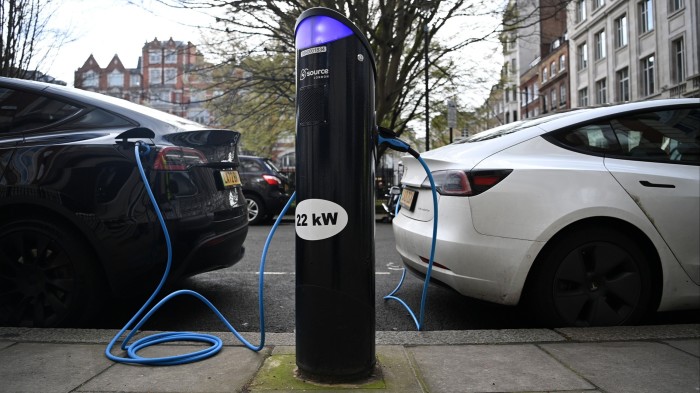Stay informed with free updates
Simply sign up to the Electric vehicles myFT Digest — delivered directly to your inbox.
UK ministers are to bring back consumer subsidies for some electric vehicles through a new scheme worth £650mn, as they try to boost sales of battery models that still lag government targets.
Households will receive a discount of up to £3,750 per vehicle when they buy a new electric car that is priced below £37,000, under a programme to be announced on Tuesday that will include £63mn of funding for charger installations.
The former Conservative government scrapped direct purchase incentives for battery-driven models in 2022, arguing that the market had sufficiently matured.
But the industry has repeatedly called for more financial assistance to encourage EV purchases.
Heidi Alexander, Labour’s transport secretary, said she wanted to make it “easier and cheaper” to buy and run an EV.
The price cap means that more expensive brands such as Elon Musk’s Tesla will be excluded, while some cars made in China will also not qualify because of the emissions produced in the manufacturing process.
The average price for an EV in the UK last year was £49,000, meaning that most cars currently on sale will not qualify — although industry figures said new, more affordable models are being launched.
Officials said they expect “tens of thousands” of grants to be issued each year — far below the near-400,000 EVs sold each year.
Eligibility will also depend on whether carmakers meet “the highest manufacturing sustainability standards”, a criteria designed to favour British-made models, according to officials.
The cars considered “greenest” will receive a discount of up to £3,750, while others in a lower band will receive up to £1,500. A third band that includes most Chinese-made cars will not receive any subsidy.
Each model will be rated according to the carbon emissions of the electricity grid in the country or countries of key production stages.
Manufacturers must also have a net zero target for their models to be allowed in the scheme.
“The final environmental score assigned to each vehicle model reflects two stages of vehicle production: vehicle assembly . . . and battery production,” the government said.
The UK previously introduced EV purchase grants of £5,000 in 2011 on vehicles worth up to £35,000, a subsidy level that was gradually reduced to £1,500 in 2021 before being scrapped altogether the following year.
The new funding to be announced on Tuesday will remain in place until 2029, and carmakers must apply for their EVs to be part of the scheme from this Wednesday. The base pricing of their new models will be assessed for the grant. The scheme does not include used EVs.
In her June Spending Review, Chancellor Rachel Reeves set aside some £1.4bn to support the continued uptake of electric vehicles, including vans and heavy goods vehicles.
EVs made up 21.5 per cent of new car sales in the UK in the first six months of the year as carmakers Renault, Stellantis and China’s BYD roll out a string of affordable models. But that is still below the 28 per cent target for the year under the government’s EV mandate.
There are currently 36 new electric car models available from under £30,000. Those EVs cost an average of 22 per cent more than their petrol equivalents, according to Auto Trader, an online marketplace.
Based on current sales and the trajectory, it projects that only 45 per cent of new car sales in UK will be EVs by 2030 — well below the 80 per cent target for that date.
“The government support announced today has the propensity to close the current affordability gap and help democratise EVs into the mass market,” said Ian Plummer, commercial director at Auto Trader.
Carmakers have called for some form of subsidised purchase scheme to be revived since the previous scheme was axed, although EV proponents say the government’s targets are now achievable after it made it easier to hit them.
“This announcement is a welcome response to consistent calls from the industry for more support,” said Mike Hawes, chief executive of the Society of Motor Manufacturers and Traders.
The Department of Transport said that 2024 was a “record year for switching to electric”, with 382,000 EVs sold and nearly 20,000 public chargers added to the network.



